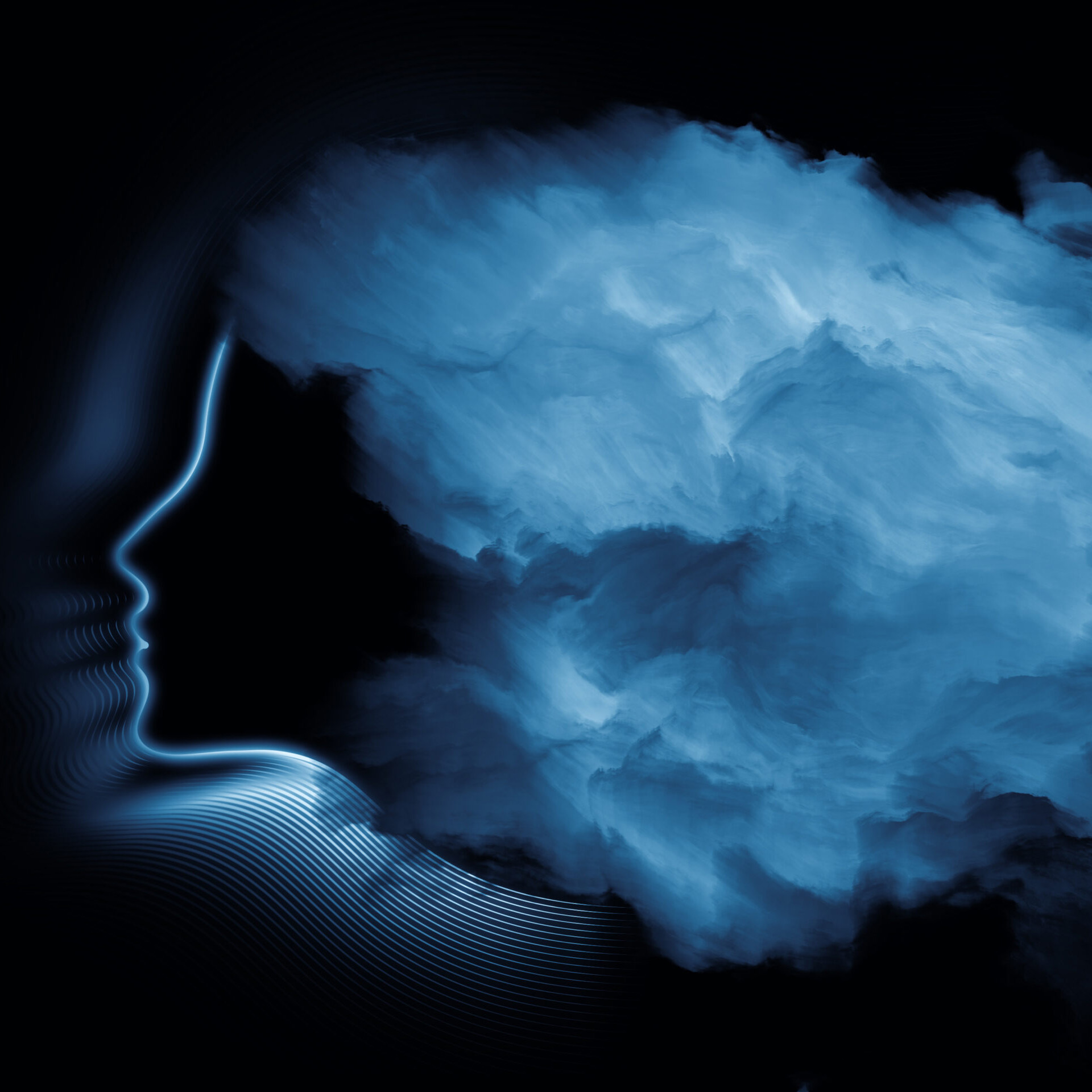Mental Health in Menopause
Understanding the impact and seeking support.

Menopause is a natural transition in life that brings a variety of physical and emotional changes. Among these, many individuals experience changes in their cognition, memory and mental health. Understanding these changes and knowing what support is available can empower individuals to maintain their mental wellbeing during this stage of life.

Memory and cognition
As we age, all of us experience changes in our cognitive abilities, including memory and concentration. During menopause, many individuals notice difficulty focusing and memory lapses, often described as ‘brain fog’. These changes can be alarming for some women, and may raise concerns about dementia, such as Alzheimer's disease. However, menopause-related cognitive changes, which may be linked to hormonal fluctuations, are typically subtle and temporary, and are not thought to be predictive of future cognitive impairment or dementia².
Key factors contributing to cognitive changes during menopause include:
- Sleep disturbances: Common in menopause, sleep issues can impair focus and memory
- A family history of menopause at an early age.
- Mood fluctuations: Depression and anxiety can interfere with cognitive functions⁶.
- Hot flushes: There is evidence of temporary changes in brain function during hot flushes, whilst severe hot flushes have been associated with worsened cognitive function.
- Other medical problems: Some medical conditions that are associated with ageing, such as high blood pressure or diabetes, have been associated with reductions in cognitive function.
- Ageing: Some cognitive functions, particularly processing speed, memory and language abilities, slowly decline with age.
While hormone therapy is not typically recommended specifically for the purpose of protecting cognitive function, there is evidence that oestrogen-containing MHT use during the early postmenopausal years might reduce the risk of developing dementia. In comparison, starting MHT later in life (e.g. over 60 years of age or more than 10 years after menopause) may worsen cognitive function.
Whilst the direct effects of MHT on cognitive function require further investigation, it is clear that MHT reduces hot flushes and sleep disturbances, which may indirectly improve cognition.
There are also several lifestyle practices that can help protect memory and brain health, which include:
- Regular exercise
- Sustaining social connections
- Staying mentally active
- Consuming a balanced diet, such as the Mediterranean diet
- Avoiding smoking and limiting alcohol consumption
- Managing cardiovascular risk factors like high blood pressure and diabetes
"
There are several lifestyle practices that can help protect memory and brain health.

Mood and emotional health
Oestrogen plays a significant role in mood regulation. During menopause, fluctuating hormone levels, along with other life stresses and changes in physical health, can affect emotional wellbeing. Many individuals experience irritability, sadness, or anxiety during perimenopause and postmenopause³.
Depression is more common during perimenopause, with hormonal shifts creating a ‘window of vulnerability’ for mood changes⁶. Those with a prior history of depression, other mental illnesses or with more severe menopausal symptoms may be at higher risk. Additionally, lifestyle factors such as caregiving responsibilities, work or relationship stress, and societal pressures can exacerbate emotional challenges¹.
Taking time to prioritise self-care, seeking social support, ensuring you have a regular GP, and considering therapy, counselling, or in some cases antidepressant medications are all important steps in managing mental health during this transition.
Anxiety, including panic attacks, during menopause is common and can be part of menopausal depression presenting during perimenopause. As the menopausal transition progresses, anxiety can be triggered or worsened by hot flashes and other menopause symptoms⁴
The unpredictable nature of hot flashes can heighten anxiety, while anxiety itself can make hot flashes more frequent. If feelings of fear or panic become overwhelming, it may be helpful to speak to a healthcare professional about strategies to manage anxiety, including mindfulness practices, psychological therapies, hormone therapy, or psychiatric medications.
Midlife often brings unique pressures, and individuals going through menopause may face added challenges related to work, caregiving, relationships, and ageing. These social and lifestyle factors can affect mental health, contributing to feelings of stress, anxiety and depression.
Recognising these shifts early is important for seeking appropriate care and support. While some manage these transitions easily, others may find that menopause acts as a tipping point leading to significant mental health challenges⁵.
The role of menopause hormone therapy (MHT) in treating menopause-related mental health issues is still debated. While MHT is not officially approved for treating depression or anxiety, research shows that it may positively impact mental health for some individuals. MHT is one of several tools that may be used to manage mental health symptoms, along with lifestyle adjustments, counselling, and medications specifically designed to address mental health concerns³.
It is essential for individuals to be informed of their options and collaborate with healthcare providers to choose the best treatment plan based on their needs and preferences.
A holistic approach to mental health during menopause combines self-care, medical treatments, and mental health support tailored to individual needs. Lifestyle interventions, such as a healthy diet, regular physical activity, and stress reduction, can improve both mental and physical wellbeing. Psychotherapy, counselling, and MHT, when appropriate, may also offer relief from mood changes, anxiety and cognitive concerns⁴.
Identifying and Managing Menopause-Related Mental Health Changes
For some, menopause can be a time of new or intensified mental health challenges, such as mood swings, anxiety, or depression. Recognising these changes early is key to seeking the right support and treatment. The MENO-D scale, developed by Professor Jayashri Kulkarni AM at Monash Alfred Psychiatry Research Centre, is recommended for those experiencing significant shifts in their mental health during this transition. This valuable resource, along with a comprehensive clinical evaluation, can assist individuals and healthcare providers create tailored treatment plans.
Menopause is not just a physical transition but also a time when mental health may require extra attention. By acknowledging the mental health challenges associated with menopause, we can better support individuals going through this life stage.
From lifestyle changes to medical treatments, options are available to help maintain emotional wellbeing and cognitive function during and after menopause.
If you or someone you know is struggling with mental health during menopause, reach out to a healthcare provider to explore supportive care options.
This page is intended for general informational purposes only. For personalised advice, consult with your healthcare provider.
Additional information
References:
1. Cohen L, S, Soares C, N, Vitonis A, F, et al. (2006) Risk of new onset of depression during the menopausal transition. Archives of General Psychiatry. 63.
2. Freeman EW (2015) Depression in the menopause transition: risks in the changing hormone milieu as observed in the general population. Women's Midlife Health, 1.
3. Kim DR and Joffe H (2006) Use of Antidepressants during Perimenopause. Women's Health, 2.
4. Kulkarni, J. Depression: a major challenge of the menopause transition. Medicine Today. 2022.
5. Kulkarni, J. The misunderstood female factor. Nature Outlook. 2022.
6. Maki P, M, Kornstein S, G, Joffe H, et al. (2019) Guidelines for the evaluation and treatment of perimenopausal depression: summary and recommendations. Journal of Women's Health, 28.